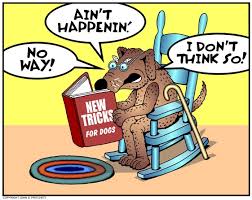Why Success Breeds Stagnation...and how to break the cycle
Richard spent eighteen years building his software training business into a steady operation. Small business owners trusted him to help them master their systems, his workshops were well-attended, and referrals kept coming. But when younger consultants started offering AI-powered learning assistants, bite-sized video modules, and same-day support via Zoom, Richard's phone stopped ringing as often. His response? "These business owners need real expertise, not automated chatbots and bite-sized modules. They need someone who can sit down and walk them through it properly."
He was half right. They did need real expertise. They also wanted learning at their own pace, answers when they had questions at 9 PM, and resources they could access without blocking out four hours for a workshop. Richard's success had blinded him to the fact that how people want to learn had fundamentally changed.
The Hidden Cost of Expertise
The same pattern recognition that made you successful can become your greatest liability. You've spent decades learning what works. You've failed, adjusted, and found formulas that deliver results. That accumulated wisdom is valuable—until it isn't.
Success creates mental shortcuts. You see a situation and instantly know the answer because you've seen it before. Except markets don't stay still. Customer expectations shift. Technology changes what's possible. Competitors find new angles. And those shortcuts start leading you in circles.
Your knowledge doesn't become wrong—it becomes incomplete. You stop questioning assumptions because they've been validated hundreds of times. "We tried that once and it didn't work" becomes a shield against experimentation. "Our customers prefer personal service" becomes an excuse not to build online systems. "We're doing fine" becomes a reason to ignore warning signs.
The difference between earned confidence and defensive certainty: confidence says "I know what's worked," while certainty says "I know what will work." One is open to new data. The other isn't.

The Market Doesn't Care About Your Track Record
Your customers aren't comparing you to who you were five years ago. They're comparing you to every experience they had this week. The restaurant with seamless reservations. The retailer with personalized emails. The service provider who responded in minutes, not days.
When your website looks like 2010, you're not just behind on web design—you're signaling you're behind on everything. When your proposal comes as a PDF with clip art and dated language, you're saying attention to detail isn't your priority. When you're using the same marketing messages from a decade ago, you're advertising that you haven't learned anything new about your customers.
The compounding effect is brutal. One outdated element might be forgiven. But outdated branding plus slow response times plus resistance to new communication channels creates a narrative: this business has stopped evolving.
You might still be excellent at your core service. Your product might be superior. Your expertise unmatched. But if you look and feel irrelevant, prospects will never find out.
Warning Signs You're Becoming Set in Your Ways
Take an honest inventory:
You haven't fundamentally changed your customer acquisition strategy in three or more years. You've tweaked it, maybe spent more or less. But the core approach? Identical.
Your marketing materials look dated. Not just the design—the language, the promises, how you position yourself. Still leading with "quality service" and "competitive prices"? That's everyone's message from 2005.
You dismiss new platforms without testing them. "LinkedIn is just for job seekers." "Video marketing is too expensive." "Nobody reads long emails." These blanket statements protect you from having to learn something new.
You surround yourself with people who validate your approach. Your inner circle thinks like you do, came up the same way, and reinforces that the old ways are still best.
You feel defensive when someone suggests a different approach. Instead of curiosity, you feel criticized. Instead of exploring, you immediately list reasons it won't work.
You can't name three meaningful things you've learned from customers in the past year. Not complaints you've handled—actual insights that changed how you think about your business.
If two or more hit home, you're not protecting your business from bad ideas. You're protecting yourself from growth.
The Mindset Shift: From Protecting to Exploring
The goal isn't to chase every trend or abandon what works. It's to stop treating your business like a museum piece that needs protection and start treating it like a living thing that needs nourishment.
Curiosity isn't an admission that you've been doing it wrong. It's compound interest on everything you already know.
Adopt "strong opinions, loosely held." Have conviction based on experience, but hold it lightly enough that contradictory evidence can change your mind. The smartest people aren't always right—they update their thinking when they encounter better information.
Create systems for continuous learning that go beyond consuming content. Real learning comes from testing and implementing. Run experiments. Try things on a small scale. Collect data. Let reality be your teacher.
The difference between a risky bet and a smart experiment is scale and structure. You don't have to bet the business. Test it with ten percent of your marketing budget, measure results, and adjust.
 Staying Fresh: Practical Strategies
Staying Fresh: Practical Strategies
Get Real Market Intelligence
Stop relying on what you think you know and start having actual conversations. Not surveys with leading questions. Real conversations where you mostly listen.
Schedule quarterly customer listening sessions. Pick five clients—mix of long-term and recent. Take them to coffee. Ask: What's changing in their business? What frustrates them about vendors in your space? What do they wish someone would offer?
Study businesses outside your industry. How do restaurants create memorable experiences? How do software companies onboard users? How do retailers personalize offers? The patterns are transferable.
Hire or consult with people who challenge your assumptions. Someone younger, from a different industry, with a different background. Give them permission to question everything. Then actually listen.
Overhaul Your Marketing
Conduct an annual marketing audit with one question: if you were starting from scratch today, what would you change? Don't make incremental tweaks. Imagine you're a competitor launching tomorrow. What would that business look like?
The gap between that and what you have is your opportunity—or your competitor's.
A/B test your assumptions. You think customers don't care about video? Test it. Split your email list. Measure results. Let data settle the argument.
Update your visual identity, messaging, and digital presence on a regular cycle. If your brand hasn't evolved in five years, it's aging in dog years.
Stop making excuses about what your customers supposedly don't care about. "Our clients are older and don't use social media." "We're B2B, so our website doesn't matter." Test these assumptions honestly.
Build Operational Excellence
Create a "sacred cow" list—assumptions that everyone treats as unquestionable. Then question one per quarter. Maybe it's pricing, service delivery, or which clients you pursue. Nothing is exempt from examination.
Dedicate a small portion of resources to exploring new methods. This keeps experimentation from being something you'll get to "someday."
Reward experimentation, not just optimization. If your team only gets recognized for improving existing processes, they'll never suggest doing something different.
Invest in Personal Development
Put yourself in beginner situations. Learn a new skill. Try a technology you've been avoiding. Join a community where you're the least experienced. This reminds you what it feels like not to know.
Cultivate relationships with people ten to twenty years younger. Not to seem cool—because they see the world differently. That context is valuable.
Read outside your industry and comfort zone. The best insights come from seeing patterns across domains.
Say "I don't know" more often. Admitting uncertainty feels like weakness when you've built a reputation on having answers. But "I don't know, let's find out" is powerful.

The Jaded Trap
After decades in business, you've been burned. Consultants who overpromised. Strategies that flopped. Investments that didn't pay off. This creates scar tissue.
The danger is when pattern recognition turns into reflexive cynicism. Every new idea becomes "we tried something like that before." Every suggestion becomes "here we go again."
Healthy skepticism protects you from bad decisions. Toxic cynicism protects you from good ones too.
The difference: Skepticism says "that's interesting, but I need evidence." Cynicism says "I already know that won't work." Skepticism evaluates. Cynicism dismisses.
"Been there, done that" thinking closes doors before you can see what's behind them. Markets evolve. Technology creates new possibilities. Methods that failed ten years ago might work now because conditions have changed.
Reframe failure. It's not validation of cynicism—it's data for iteration. Every failed experiment tells you something. But only if you're still experimenting.
Building a Culture of Continuous Renewal
If you lead a team, your attitude toward change sets the tone. When you dismiss new ideas, your team stops bringing them. When you default to "we've always done it this way," you signal innovation isn't valued.
Create psychological safety for new ideas. Respond to suggestions with genuine curiosity even when your instinct is skepticism. Protect people who try something new and fail. Show through actions that thinking differently is expected.
Success can insulate you from reality. When money is still coming in and clients aren't leaving en masse, it's easy to miss early signals that your competitive position is eroding. The best time to evolve is when you don't have to—when you still have resources, momentum, and goodwill.
Make curiosity a competitive advantage. Most veteran business owners are coasting on past success. Being genuinely curious about what's next is a differentiator.
Growth Isn't Optional
The businesses that thrive long-term are led by people who never stopped being students. Who stayed hungry even after they'd made it. Who treated their expertise with respect but not reverence.
Your past success is both your greatest asset and your biggest liability. It proves you know how to build something valuable. But it can trick you into thinking the learning is done.
The market rewards relevance, not tenure. Your twenty years of experience matter tremendously—but only if they represent twenty years of evolution, not one year repeated twenty times.
Here's your challenge: Pick one thing you've been dismissing. One platform you've written off. One approach you've decided won't work. One piece of feedback you've been ignoring.
Don't commit to making it your new strategy. Just commit to genuinely experimenting with it. Small scale. Time-boxed. Measured.
Run the experiment. Collect the data. See what happens.
You might find your skepticism was justified. Or you might find something that transforms how you do business.
Either way, you'll have learned something new. And that—not any particular tactic or strategy—is what keeps a business vital.
The question isn't whether your market will change. It's whether you'll change with it.

 Staying Fresh: Practical Strategies
Staying Fresh: Practical Strategies